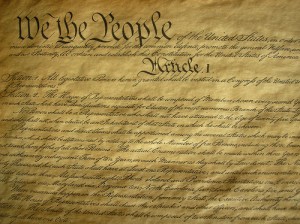Constitution
Citizenship

1) Citizenship is the grant of a personal status to the citizen and it creates a bond of loyalty between the citizen and the State, and endows him or her with nationality.
Notes on citizenship, continued…
2) Naturalized citizens may be required to take a pledge of loyalty. For example:
I pledge allegiance to the flag of the United States and to the Republic for which it stands: one nation indivisible with liberty and justice for all.
3) Citizenship carries with it both rights and responsibilities. Citizens should work toward the betterment of their community through economic participation, public service, volunteer work, and other such efforts to improve life for all citizens.
4) Citizenship as thus defined will not be very conspicuous in a heterogeneous population whose children and were not imbued with a strong sense of national character. This obviously applies to illegal Hispanic immigrants in America who maintain their past sympathies or attachments.
5) Japan does not give citizenship to a child born of Japanese parents if the child was raised abroad by his own parents, as might happen if the parents were in the diplomatic corps.
6) Under Jordan’s Nationality law of February 4, 1954, a person became a Jordanian national if, “not being Jewish, he possessed Palestine nationality before May 14, 1948 and, at the date of publication of this law, was ordinarily resident in the Hashemite Kingdom of Jordan.” This is less a manifestation of racism than of national pride and political prudence.
7) Making Muslims citizens of a Jewish state is more foolish than making Jews citizens of any Muslim state, considering only the disparity in their respective populations in the Middle East. Just as only Jews are qualified to make the laws of a Jewish state – think of the knowledge and reverence required to preserve the Jewish tradition, its religious precepts and practices, its methods of education, the memory of its great teachers and leaders – so only Muslims are qualified to make the laws of any Muslim state. (Attn. Ted Cruz on illegal immigration.)
8) A large majority of Muslim Arab citizens of Israel identify with Israel’s enemies, including Hamas. In fact, many of these Muslim Arab citizens have aided and/or committed terrorist attacks against Israel.
9) The Balfour Declaration, the St. Remo Convention, the Anglo-American Accord, the UN Resolution affirming the establishment of the State of Israel, as well as Israel’s own Declaration of Independence, project and/or designate Israel as a Jewish state, and not as a multicultural state. The latter is the disloyal preference of post-Zionists in Israel, as well as of certain members of Israel’s Supreme Court, as may be seen in various rulings of the Court’s former and most influential Chief Justice, Aharon Barak.
10) That it’s not simple for a devout Muslim to identify with Israel as a Jewish state is obvious. It’s also obvious that Muslims in America are not thrilled to pledge allegiance to secular America. But that is the condition of enjoying the rights and opportunities that come with Israeli or American citizenship.
11) Citizenship for an immigrant with traditional moral values can be problematic in certain democracies.
12) The reason is this. There are two kinds of Democracy, contemporary or Normless democracy, and classical or Normative democracy. Freedom and Equality are their basic principles. However, in a Normless democracy, freedom and equality lack ethical and rational constraints. The situation is otherwise in a normative democracy, where freedom and equality are rooted in the Bible’s conception of man’s creation in the Image of God.
13) Neither Israel nor America can be classified rightly as a Normative Democracy, and not only because their Supreme Courts have legalized pornography and homosexuality (to say nothing of same-sex marriage in America). The political leaders of these two democracies have amplified their normless propensities by consorting with and appeasing Muslim despots dedicated to their country’s destruction.
14) Consistent with the absence of substantive normative principles in their ideologies, political apathy and moral indifference in America and Israel are commonplace, and to such an extent that the Executive branch of each country consorts, respectively, with Iranian and Palestinians leaders committed America’s and Israel’s destruction, and does this without discernible public protest, let alone outrage.◙
-

 Civilization4 days ago
Civilization4 days agoWhy Europe Shouldn’t Be Upset at Trump’s Venezuelan Actions
-

 Executive5 days ago
Executive5 days agoHow Relaxed COVID-Era Rules Fueled Minnesota’s Biggest Scam
-

 Christianity Today4 days ago
Christianity Today4 days agoSurprising Revival: Gen Z Men & Highly Educated Lead Return to Religion
-

 Civilization5 days ago
Civilization5 days agoThe End of Purple States and Competitive Districts
-

 Executive4 days ago
Executive4 days agoWaste of the Day: Can You Hear Me Now?
-

 Civilization2 days ago
Civilization2 days agoTariffs, the Supreme Court, and the Andrew Jackson Gambit
-

 Civilization2 days ago
Civilization2 days agoWhy Europe’s Institutional Status Quo is Now a Security Risk
-

 Civilization3 days ago
Civilization3 days agoDeporting Censorship: US Targets UK Government Ally Over Free Speech











Ron Chronicle liked this on Facebook.